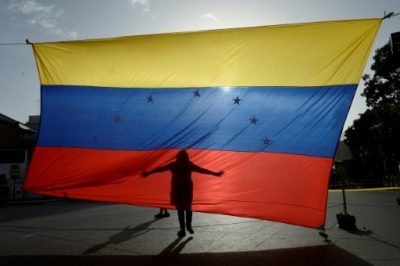Venezuelan Constituent Assembly Approves Workers’ Councils Law
The Constitutional Law of Productive Councils of Workers gives legal status to bodies which already exist in many workplaces and is aimed at giving workers greater protagonism in the productive process.

Venezuela’s National Constituent Assembly (ANC) passed a new law aimed at empowering the organised working class this past Tuesday. The Constitutional Law of Workers’ Productive Councils (CPTT) was a product of the ANC’s Workers’ Commission and was drawn up as part of a broad consultation process.
“It’s time for socialism,” stated President Maduro following the law’s approval.
“It’s impossible to think of socialism without the working class. The working class has always been and will be the driving force in the building of the future of socialism, in Venezuela, and in the entire world,” he continued.
Himself a former union leader, Maduro called on the workers to immediately incorporate themselves as CPTTs into the national body charged with enforcing Venezuela’s price controls and to get to work in ironing out bottlenecks and problems in the country’s industries.
According to Francisco Torrealba, head of the ANC Workers’ Commission and president of the Caracas Metro Workers’ Union, the legislation is aimed at increasing workers’ participation in national production.
“It is a law which has as its fundamental objective to foster, make possible, and achieve the leading participation of the workers of the nation, who are those who make it possible for us to have goods and services which have been systematically attacked by the economic war,” explained Torreabla.
“The councils of workers will have a leading role in the monitoring and effective control over what is going on in the factories… They will guarantee that we can elevate the production of goods and services to their highest possible levels, especially in those goods of massive consumption and primary necessity,” he added.
The CPTTs look to work alongside and not replace existing trade union organisations. They focus on involving the workers in the running of the workplace rather than protecting workers and workplace conditions, which falls under the purview of union representatives.

The National Constituent Assembly in session with representatives of the working class observing in the balcony. (Source: Venezuelanalysis.com)
Under Article 7 of the new law, other grassroots organisations will be incorporated into the councils, such as local women’s groups, communal councils, communes, ecological groups and others. The article explains that all spokespersons will be elected by the workers, and where possible include at least one woman, one person from the national Bolivarian Militia, and one person under 35 years of age.
Often production of basic goods in Venezuela is hindered or limited due to a breakdown of a single element in the productive chain. Once such example has been the recent shortage in bread, which was due to problems in importing flour.
Another example is the processing of crude oil into gasoline. In December, when international payments for the compound chemicals needed to facilitate such a process were withheld due to the new US financial sanctions against Venezuela, the entire productive process collapsed, resulting in long lines at gas stations nationwide. Further examples include public transport units not fit for use due to a shortages of repair parts, or egg production hindered by shortages of chicken feed. These problems have been further exacerbated by corruption, hoarding, and reselling of raw materials, among other illicit practices which have been at the center of an anti-corruption probe by Attorney General Tarek William Saab into the oil industry and import sector.
Articles 11 and 12 stipulate the responsibilities of the spokespersons of the councils, which include the responsibility to denounce corruption, hoarding and reselling of goods, and other economic crimes which are harshly punished by Venezuelan law. They are also charged with informing state authorities of problems in the productive process so as to enable their rapid resolution.
Workers’ councils have organically sprung up since 2005 and have been mostly concentrated in state-run industries. Since then, the councils have been pushing for the passing of a law to regulate and safeguard their existence and activities. Legislation for such a law, initially introduced into the National Assembly by the Communist Party of Venezuela in 2005 as the Socialist Workers’ Councils Law, had been bouncing around different commissions ever since without ever reaching a vote, despite massive pro-government majorities in parliament until 2016.
However, due to the lack of any legislation backing their existence, councils have often been ignored or persecuted by workplace management, both in the private and public sectors, such as in Tromerca, the state-run tram system in Merida State, in which numerous workers were illegally fired two years ago for organising a council.
In response to past problems of illegal firing of workers trying to organise their workplace, Article 15 of the law declares “workplace irremovability” of workers involved from the moment the management is notified of the organisation of a CPTT, while Article 19 outlines sanctions of any management member who obstructs the development of the CPTT.
Following the law’s approval, ANC President Delcy Rodriguez took to Twitter to celebrate the law’s passage stating,
“From the ANC we have fulfilled our responsibilities to the workers of the country! The historic driving force of the socio-economic transformation of Venezuela.”
Desde la Constituyente @ANC_ve le cumplimos a los trabajadores del país! Motor histórico de la transformación económico social de Venezuela https://t.co/bxD5HYqeLP
— Delcy Rodríguez (@DrodriguezVen) January 30, 2018
ANC deputy Yahiris Rivas explained that workers’ councils have “been working in the last few months in a progressive way and have shown positive results in productive levels.”
“The councils look to contribute to the productivity, efficiency, and stocking of productive goods,” she added, highlighting that the councils will work closely with the Local Productive and Suplly Councils (CLAPs) which distribute subsidised food directly to the communities.
Rivas also explained that one of the major objectives of this law is “to consolidate popular power in the working class”.

